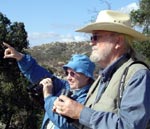| Bird-Watching
on the Road, by
Alice Zyetz |
Another pleasurable byproduct of RV travel
is the ability to go anywhere to view birds you don't ordinarily
see at home. And you don't have to be an expert to enjoy the
experience. All you need is a good book, a pair of binoculars,
and the ability to get up early. My husband and I did fine on
the first two, but struggled with the third. We are the type
of RVers who get going at "the crack of noon."
Years ago, we were introduced to bird watching
by our friend Betty Prange and her late husband Lin Strout.
They were traveling west and we were heading east, but we
agreed to meet at their favorite spot south of Albuquerque,
New Mexico: Bosque
del Apache Wildlife Refuge. It's the autumn home of tens
of thousands of migrating sandhill cranes and arctic geese.
We set our alarm to wake up before sunrise so we could watch
the birds as they flocked from their sleeping spots in the
marshes to their feeding places in the fields. Surrounded
by hordes of chattering cranes overhead, we fell in love with
bird watching. We are still novices, but have been befriended
by serious birders and introduced to some of the great locales
throughout the United States.
WHERE TO GO
RVers Carl and Ann Erickson have many favorite
spots, and I have them to thank for much of the information
in this column. They especially love the Cave
Creek region in the Chiricahua Mountains of southeastern Arizona.
In the valley are huge pieces of sandstone, some as big as
skyscrapers. RVs 25 feet long or less can be accommodated
in the campgrounds. Many birds come to nest there and then
return south to Central America. Among others, they saw a
flame-colored hepatic tanager, a peregrine falcon, and an
elegant trogon (also known as coppery-tailed trogan) colored
red and green.
Also in Southeastern Arizona is Ramsey
Canyon with fourteen different species of hummingbirds.
The whole area east and south of Tucson is a birder's paradise.
Another great location is the Everglades.
While in Florida, check out the Florida Keys, Sanibel Island,
and various reserves along the west coast. Many excellent
reserves are in Texas and the Gulf States. Check before you
go to make sure they haven't been damaged by hurricane Katrina.
Among the many interesting species are the anhingas and frigate
birds, which look almost prehistoric.
Point Pelee in Ontario, Canada, has a huge marsh
on the east side where Canadian birds fuel up in the fall
before they head south. Other locations include the Olympic
Peninsula in Washington, Salton Sea and Balboa Park in California,
and Hawk Hill in Marin County, California, which is a good
place to see raptors.
Next>
Bird-watching Resources
Alice Zyetz
1/29/06
Page 1|2
More
RVing Articles>






